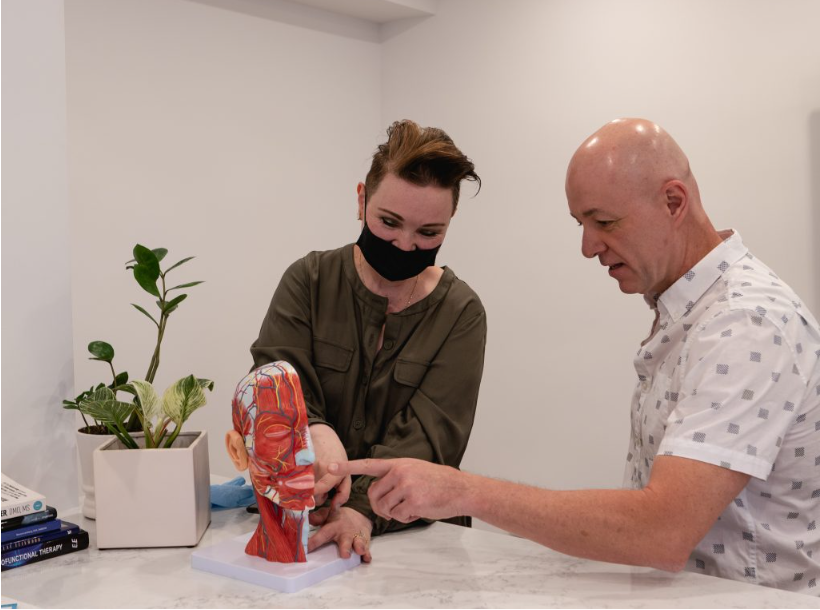
Sleep is a cornerstone of good health, and poor sleep can impact every aspect of life—from mood and energy to cognitive function and physical well-being. One lesser-known contributor to poor sleep quality is mouth breathing. Although it might seem harmless, breathing through the mouth, particularly at night, can have a surprising and significant impact on sleep quality. Over time, habitual mouth breathing can lead to issues such as fragmented sleep, chronic fatigue, and even obstructive sleep apnea. Understanding the connection between mouth breathing and sleep can help in making adjustments to improve both breathing habits and overall health.
Why Mouth Breathing Matters
Human beings are naturally designed to breathe through the nose. The nasal passages filter, warm, and humidify the air before it reaches the lungs, providing a smooth flow that encourages slower, more efficient breathing. Nose breathing is also essential for optimal oxygen uptake, proper circulation, and maintaining a healthy balance of oxygen and carbon dioxide in the blood.
Mouth breathing, on the other hand, bypasses these benefits. When someone habitually breathes through the mouth, they are not only more susceptible to unfiltered and dry air but also at risk of developing issues that interfere with restful sleep. Chronic mouth breathing, particularly at night, can quickly become a hidden contributor to ongoing sleep disturbances.
How Mouth Breathing Affects Sleep Quality
Mouth breathing can disrupt sleep quality in several ways, directly impacting both physical health and cognitive function. Here are some of the most common ways it affects sleep:
1. Snoring and Obstructive Sleep Apnea
One of the most immediate consequences of mouth breathing is the tendency to snore, as mouth breathing can partially obstruct the airway. When the mouth is open during sleep, it can lead to vibrations in the soft tissues of the throat, producing the familiar sound of snoring. Snoring may seem benign, but it is often a precursor to obstructive sleep apnea (OSA), a condition in which the airway becomes blocked, preventing oxygen from reaching the lungs.
In cases of OSA, mouth breathing compounds the problem, making it harder for individuals to achieve deep, restorative sleep. People with OSA experience frequent awakenings—sometimes dozens or even hundreds of times a night—due to the lack of oxygen, leading to fragmented sleep, morning headaches, and daytime fatigue.
2. Fragmented and Shallow Breathing
Mouth breathing encourages shallow, fast breathing rather than the deep, slow breaths that come with nasal breathing. This shallow breathing disrupts the natural rhythm of sleep, making it difficult to achieve and sustain the deep sleep stages (such as REM and slow-wave sleep) that are essential for restoration and healing. Shallow breathing also affects the brain’s response to carbon dioxide, sometimes causing people to wake up frequently, reducing overall sleep quality and leaving them feeling tired even after a full night in bed.
3. Increased Dry Mouth and Throat Irritation
Mouth breathing leads to dryness in the mouth and throat, as the mouth is not designed to humidify air the way the nasal passages do. Waking up with a dry mouth or sore throat is a common sign of mouth breathing at night, and it can cause discomfort that interrupts sleep. Chronic dryness can also contribute to bad breath and, over time, to gum disease and cavities, adding further discomfort and health issues that can interfere with restful sleep.
4. Reduced Oxygen Intake and Poor Blood Circulation
The nose plays a key role in regulating the balance of oxygen and carbon dioxide in the body. By filtering and conditioning the air, nasal breathing enhances oxygen intake, which supports healthy blood flow and circulation. Mouth breathing, in contrast, can reduce oxygen intake and increase stress on the cardiovascular system, resulting in poor blood circulation, which can affect overall energy levels and brain function. Lower oxygen levels during sleep also reduce the brain’s ability to repair and regenerate, affecting mood, memory, and alertness during the day.
Causes of Mouth Breathing During Sleep
Several factors can lead to mouth breathing during sleep, including:
- Nasal Congestion: Allergies, sinus infections, or colds can block the nasal passages, causing people to mouth breathe for easier airflow.
- Anatomical Issues: Enlarged tonsils, adenoids, or a deviated septum can obstruct the nasal passages, making it challenging to breathe through the nose.
- Habitual Mouth Breathing: If someone develops a habit of mouth breathing due to childhood allergies or untreated nasal blockages, it can persist into adulthood, becoming a default breathing pattern.
- Sleep Apnea: People with sleep apnea often breathe through their mouths to compensate for frequent airway blockages, perpetuating the cycle of poor sleep and disrupted breathing.
Solutions for Improving Sleep Through Better Breathing
The good news is that mouth breathing can be addressed with some simple techniques and interventions. Here are some strategies that may help:
1. Address Underlying Nasal Congestion
Treating the root cause of nasal congestion, such as allergies or sinus infections, is essential. Over-the-counter antihistamines, saline nasal sprays, or decongestants can provide relief in the short term. For chronic congestion, consulting an ear, nose, and throat specialist may reveal underlying issues such as a deviated septum or enlarged adenoids that could be contributing to mouth breathing.
2. Practice Breathing Exercises
Retraining yourself to breathe through the nose can make a significant difference in sleep quality. Simple exercises, such as alternating nostril breathing or deep breathing through the nose, can strengthen nasal breathing muscles and establish a new breathing habit. Many people find that practicing these exercises during the day makes it easier to maintain nasal breathing at night.
Final Thoughts
Mouth breathing may seem like a minor issue, but it can significantly affect sleep quality and overall health. By contributing to snoring, shallow breathing, and oxygen deprivation, mouth breathing disrupts the essential processes that occur during sleep, resulting in fatigue, irritability, and long-term health challenges. Addressing mouth breathing through nasal care, breathing exercises, and lifestyle adjustments can improve both sleep quality and overall health, leading to better rest, increased energy, and enhanced well-being.












